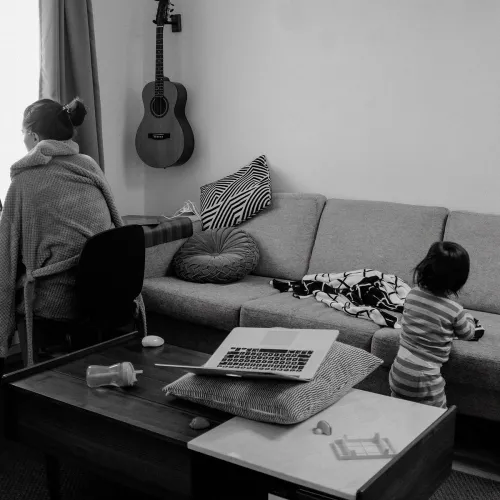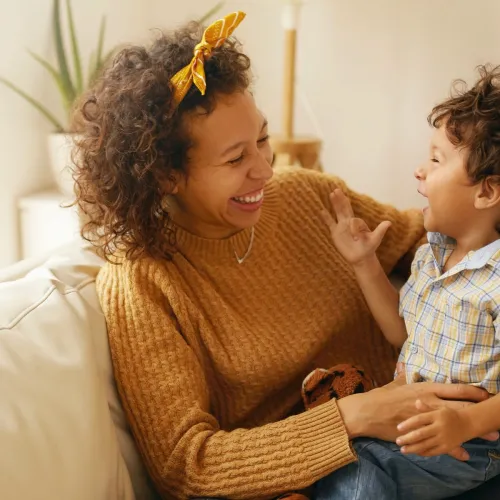What If Your Co-Parent Disagrees About the Covid-19 Vaccination for Children? These Communication Tips Can Help
Covid-19 has really complicated co-parenting. There are multiple hot-topic health issues to discuss, like whether children should still wear masks and whether they should be vaccinated against covid. Negotiations can become heated.

The American Academy of Pediatrics says that only about one third (29%) of eligible children ages 5-11 have completed the two-dose COVID vaccination series. The decision to vaccinate a child seems to be controversial universally, and co-parenting can muddle the issue even further.
Many factors influence this discussion: political views, opinions about vaccinations in general, and personal experiences with the virus. But psychologist, researcher, and nationally renowned co-parenting expert Dr. Marsha Kline Pruett has a strategy for tackling this topic.
While children’s safety and well-being are worth fighting for, this conflict can be handled the same way you handle other co-parenting disagreements. By following Dr. Kline Pruett’s co-parenting tips for navigating vaccination discussions, you and your former partner can reach an agreement that is in your child’s best interest.
1. Pick a time to talk
Dr. Kline Pruett says it’s important to have these conversations when children are out of hearing range. Parental conflict can worry children in general, but your children may even develop fears based on what they pick up about one parent’s concerns (like feeling nervous about getting the Covid-19 vaccine).
Develop a plan for when and where you will discuss this topic with your co-parent. Consider planning the conversation for a time when the children are out of the house or occupied (like at school or at an activity), not in passing during drop-off or at a family event.
2. Take turns sharing your opinions
Both you and your co-parent should get a chance to share your opinions without interruption. Try to really listen to each other for a specified timeframe, and then repeat back what was heard to make sure you each understand the other’s position correctly.
The important thing here is to make sure you each feel heard and that your views are respected, even if the other parent disagrees. In fact, research shows that in a relationship, feeling heard is more important than resolving the argument. Once each of you feels heard, Dr. Kline Pruett says, “There should be a softening, a sense that you aren’t just digging your heels in, but really trying to be collaborative.”
This creates a better mindset for reaching these kinds of important decisions. If you can get to a place where you trust each other to do what is best for the children, and you can avoid angry interactions, then you’ll have an easier time making decisions as co-parents.

3. Call out the areas in which your opinions differ
Keep your focus on the issue at hand. Start by labeling specific points of difference and points of agreement. It can be easy to bring other areas of conflict into a discussion, but Dr. Kline Pruett says to resist it.
If other past disagreements come up, return your focus to the central idea—whether your child should get the Covid-19 vaccination. You can set different times to discuss other issues.
4. Pause to do some research
If you’re both well-informed about the issue, your discussion will be more productive. As you’re talking, keep a list of questions based on your differences of opinion. Then, pause the conversation so that you can each get more information.
Consult neutral sources that you both trust, like your child’s pediatrician or teacher. Or seek out your own physicians if you would trust their medical input.
Resources like the Center for Disease Control (CDC) or Made to Save can provide helpful information to families looking to make Covid-related health decisions. Or look for reliable sources from medical experts. But be wary of news sites if your politics differ—they may bring up other issues.
Make sure you both engage in this research independently. Don’t rely on one partner to find all the information. You both want to be well informed on the topic when you revisit the discussion together.
5. Share and discuss your findings
Once you’ve gathered new information, share what you’ve learned and check in to see if either of you have positions that have changed. Review the answers to the questions you developed together and figure out if they help resolve your differences.
If any questions remain, continue searching for expert information until you have all the information you need to make an educated decision. Make sure you keep giving each other ample time to share and to listen.

6. Align on a decision
It’s ultimately important to show your child a united front. Mixed messages in co-parenting can hurt or confuse children, so try to hide any negativity surrounding the discussion. “You want to lower your child’s anxiety,” explains Dr. Kline Pruett, “and give her information that will help her feel more comfortable.”
If either of you have hurt feelings after your discussion, consider conflict resolution techniques so that the experience doesn’t hamper future communication.
Once a decision is reached, you may want to put the decision in writing, especially if one of you tends to be an uncooperative co-parent. Develop a simple document with the date, the decision, and signatures from both parents to make sure everyone is on the same page before taking action.
If you’re still struggling to reach an agreement after following these steps, Dr. Kline Pruett suggests adding a neutral third party into the mix: a mediator, a therapist, or even a close family friend. This person may be able to help move the conflict forward by keeping the conversation focused. This doesn’t need to be a long-term arrangement—but sometimes introducing a third party for specific decisions can open the door to additional mediated discussions.
These six steps work for discussions aside from Covid-19, too. Co-parenting can be difficult, but it’s easier if you have a strategy for approaching disagreements. To learn more strategies, read our article on effective communication after divorce.
One more way to improve your communication
If you can’t speak face-to-face, or if conflict is especially high, or if you want your whole conversation recorded, then OurFamilyWizard can guide conversations in a productive direction. All messages are permanently recorded (with no option to edit or delete), so there’s motivation to choose your words carefully. Plus, ToneMeter helps point out language that could escalate the tension.
You can download a report of your conversation, too, and OurFamilyWizard reports are often used in court. With your permission, your lawyer can view all app activity directly, providing even more motivation to keep it civil.
Whatever strategies you use, your children will benefit from your thoughtful approach.






